INF80044 Assignment 2: Leading an Effective Project Team Report
VerifiedAdded on 2022/11/14
|17
|4368
|274
Report
AI Summary
This report delves into the crucial aspects of leading an effective project team, focusing on team management, communication, and conflict resolution. It examines the factors influencing team dynamics, such as cohesiveness, positive attitudes, and clearly defined roles. The report highlights the importance of understanding team members' skills and needs, emphasizing open communication to mitigate risks and foster collaboration. It discusses various leadership styles, including democratic and supportive approaches, and provides recommendations for successful project team leadership. The research also analyzes the impact of team conflict, ineffective communication, and unclear roles on project outcomes, offering strategies to overcome these challenges. The report uses examples like the Cross River Rail project in Australia and the Myers online shopping project to illustrate the impact of effective and ineffective team management practices. It emphasizes the need for proactive management of team dynamics to achieve project success. The report concludes with actionable insights for project managers to enhance team performance and deliver desired results.

Running head: PM
How to lead an effective project team?
Name of Student
Name of University
Author Note
How to lead an effective project team?
Name of Student
Name of University
Author Note
Paraphrase This Document
Need a fresh take? Get an instant paraphrase of this document with our AI Paraphraser
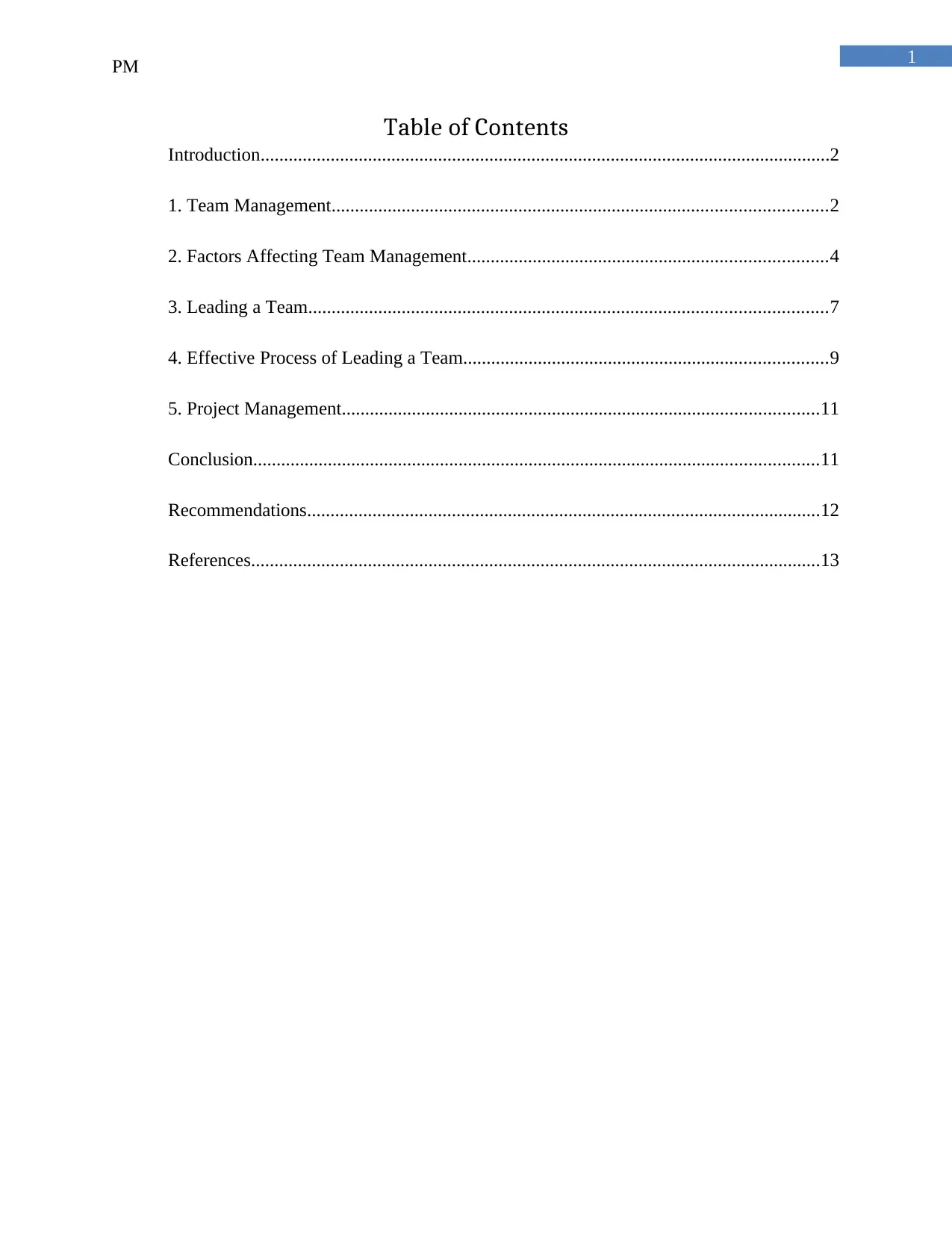
1
PM
Table of Contents
Introduction..........................................................................................................................2
1. Team Management..........................................................................................................2
2. Factors Affecting Team Management.............................................................................4
3. Leading a Team...............................................................................................................7
4. Effective Process of Leading a Team..............................................................................9
5. Project Management......................................................................................................11
Conclusion.........................................................................................................................11
Recommendations..............................................................................................................12
References..........................................................................................................................13
PM
Table of Contents
Introduction..........................................................................................................................2
1. Team Management..........................................................................................................2
2. Factors Affecting Team Management.............................................................................4
3. Leading a Team...............................................................................................................7
4. Effective Process of Leading a Team..............................................................................9
5. Project Management......................................................................................................11
Conclusion.........................................................................................................................11
Recommendations..............................................................................................................12
References..........................................................................................................................13
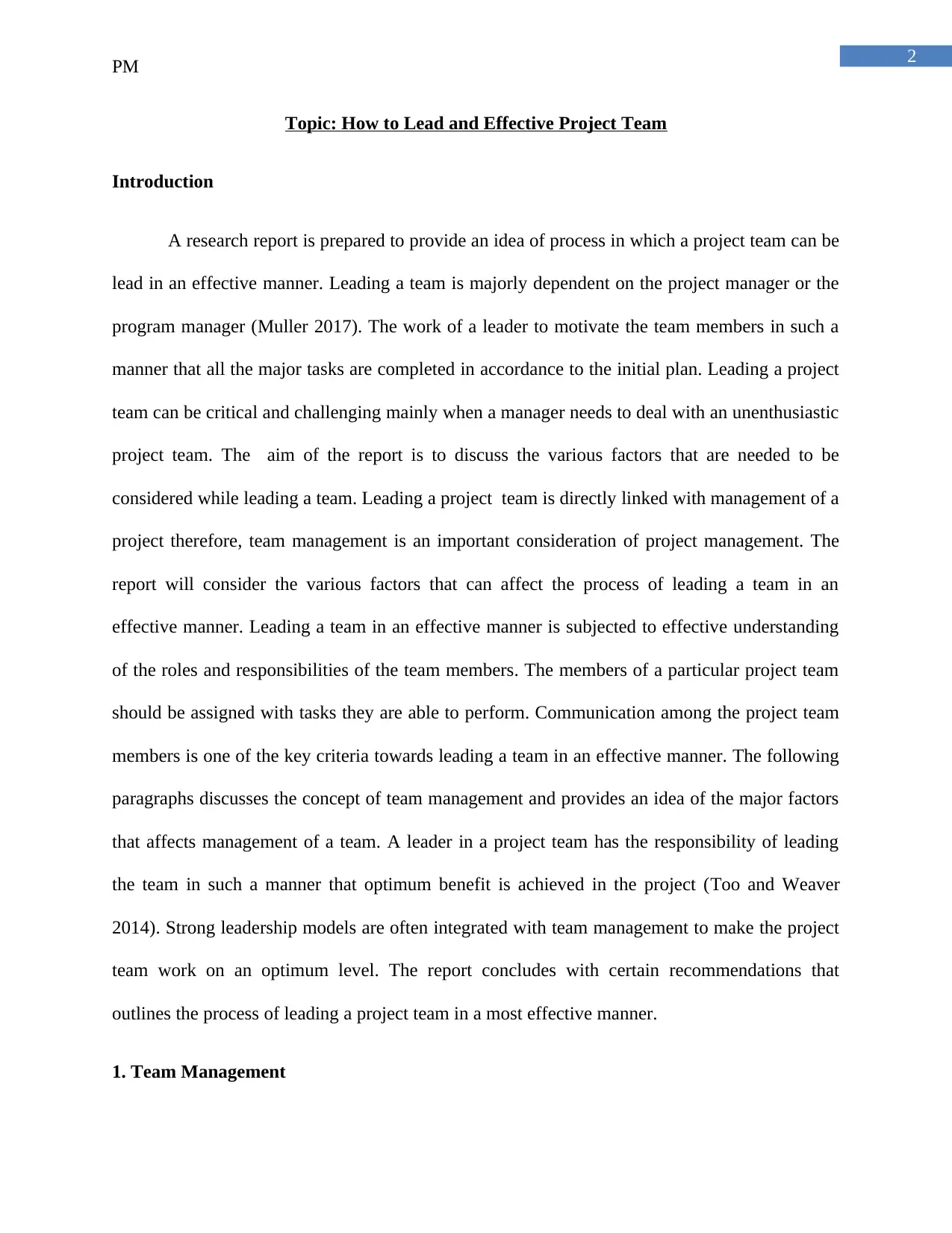
2
PM
Topic: How to Lead and Effective Project Team
Introduction
A research report is prepared to provide an idea of process in which a project team can be
lead in an effective manner. Leading a team is majorly dependent on the project manager or the
program manager (Muller 2017). The work of a leader to motivate the team members in such a
manner that all the major tasks are completed in accordance to the initial plan. Leading a project
team can be critical and challenging mainly when a manager needs to deal with an unenthusiastic
project team. The aim of the report is to discuss the various factors that are needed to be
considered while leading a team. Leading a project team is directly linked with management of a
project therefore, team management is an important consideration of project management. The
report will consider the various factors that can affect the process of leading a team in an
effective manner. Leading a team in an effective manner is subjected to effective understanding
of the roles and responsibilities of the team members. The members of a particular project team
should be assigned with tasks they are able to perform. Communication among the project team
members is one of the key criteria towards leading a team in an effective manner. The following
paragraphs discusses the concept of team management and provides an idea of the major factors
that affects management of a team. A leader in a project team has the responsibility of leading
the team in such a manner that optimum benefit is achieved in the project (Too and Weaver
2014). Strong leadership models are often integrated with team management to make the project
team work on an optimum level. The report concludes with certain recommendations that
outlines the process of leading a project team in a most effective manner.
1. Team Management
PM
Topic: How to Lead and Effective Project Team
Introduction
A research report is prepared to provide an idea of process in which a project team can be
lead in an effective manner. Leading a team is majorly dependent on the project manager or the
program manager (Muller 2017). The work of a leader to motivate the team members in such a
manner that all the major tasks are completed in accordance to the initial plan. Leading a project
team can be critical and challenging mainly when a manager needs to deal with an unenthusiastic
project team. The aim of the report is to discuss the various factors that are needed to be
considered while leading a team. Leading a project team is directly linked with management of a
project therefore, team management is an important consideration of project management. The
report will consider the various factors that can affect the process of leading a team in an
effective manner. Leading a team in an effective manner is subjected to effective understanding
of the roles and responsibilities of the team members. The members of a particular project team
should be assigned with tasks they are able to perform. Communication among the project team
members is one of the key criteria towards leading a team in an effective manner. The following
paragraphs discusses the concept of team management and provides an idea of the major factors
that affects management of a team. A leader in a project team has the responsibility of leading
the team in such a manner that optimum benefit is achieved in the project (Too and Weaver
2014). Strong leadership models are often integrated with team management to make the project
team work on an optimum level. The report concludes with certain recommendations that
outlines the process of leading a project team in a most effective manner.
1. Team Management
⊘ This is a preview!⊘
Do you want full access?
Subscribe today to unlock all pages.

Trusted by 1+ million students worldwide
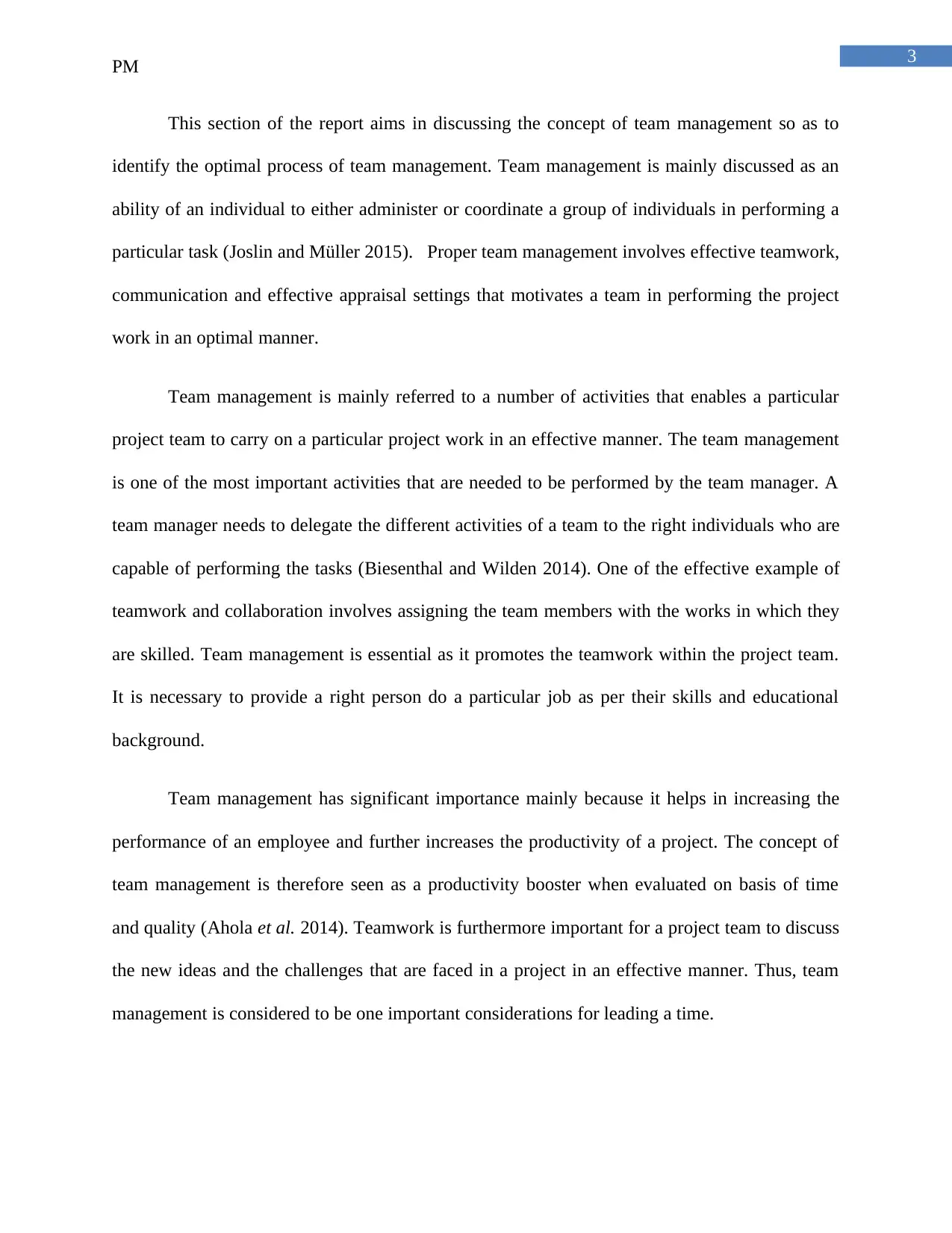
3
PM
This section of the report aims in discussing the concept of team management so as to
identify the optimal process of team management. Team management is mainly discussed as an
ability of an individual to either administer or coordinate a group of individuals in performing a
particular task (Joslin and Müller 2015). Proper team management involves effective teamwork,
communication and effective appraisal settings that motivates a team in performing the project
work in an optimal manner.
Team management is mainly referred to a number of activities that enables a particular
project team to carry on a particular project work in an effective manner. The team management
is one of the most important activities that are needed to be performed by the team manager. A
team manager needs to delegate the different activities of a team to the right individuals who are
capable of performing the tasks (Biesenthal and Wilden 2014). One of the effective example of
teamwork and collaboration involves assigning the team members with the works in which they
are skilled. Team management is essential as it promotes the teamwork within the project team.
It is necessary to provide a right person do a particular job as per their skills and educational
background.
Team management has significant importance mainly because it helps in increasing the
performance of an employee and further increases the productivity of a project. The concept of
team management is therefore seen as a productivity booster when evaluated on basis of time
and quality (Ahola et al. 2014). Teamwork is furthermore important for a project team to discuss
the new ideas and the challenges that are faced in a project in an effective manner. Thus, team
management is considered to be one important considerations for leading a time.
PM
This section of the report aims in discussing the concept of team management so as to
identify the optimal process of team management. Team management is mainly discussed as an
ability of an individual to either administer or coordinate a group of individuals in performing a
particular task (Joslin and Müller 2015). Proper team management involves effective teamwork,
communication and effective appraisal settings that motivates a team in performing the project
work in an optimal manner.
Team management is mainly referred to a number of activities that enables a particular
project team to carry on a particular project work in an effective manner. The team management
is one of the most important activities that are needed to be performed by the team manager. A
team manager needs to delegate the different activities of a team to the right individuals who are
capable of performing the tasks (Biesenthal and Wilden 2014). One of the effective example of
teamwork and collaboration involves assigning the team members with the works in which they
are skilled. Team management is essential as it promotes the teamwork within the project team.
It is necessary to provide a right person do a particular job as per their skills and educational
background.
Team management has significant importance mainly because it helps in increasing the
performance of an employee and further increases the productivity of a project. The concept of
team management is therefore seen as a productivity booster when evaluated on basis of time
and quality (Ahola et al. 2014). Teamwork is furthermore important for a project team to discuss
the new ideas and the challenges that are faced in a project in an effective manner. Thus, team
management is considered to be one important considerations for leading a time.
Paraphrase This Document
Need a fresh take? Get an instant paraphrase of this document with our AI Paraphraser
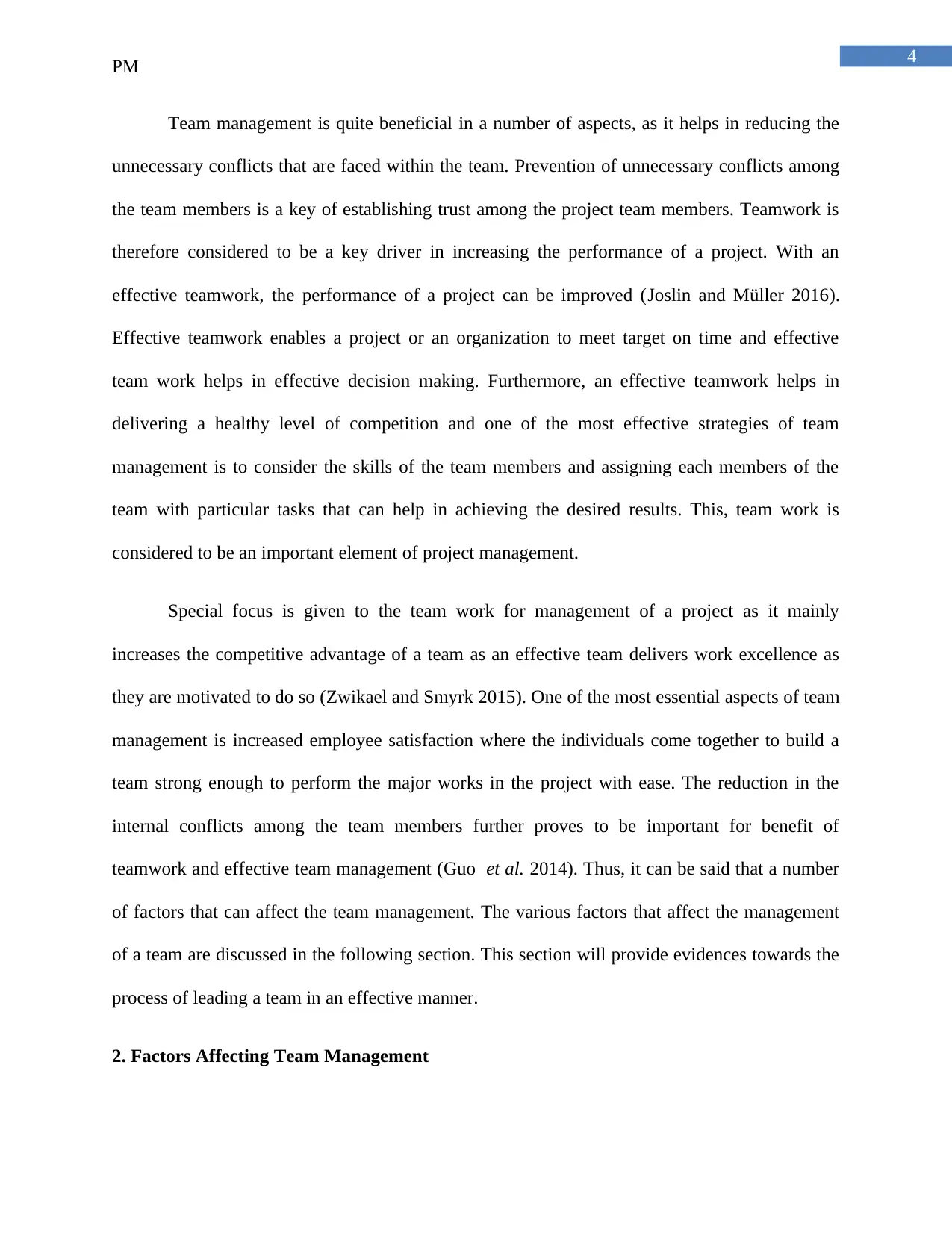
4
PM
Team management is quite beneficial in a number of aspects, as it helps in reducing the
unnecessary conflicts that are faced within the team. Prevention of unnecessary conflicts among
the team members is a key of establishing trust among the project team members. Teamwork is
therefore considered to be a key driver in increasing the performance of a project. With an
effective teamwork, the performance of a project can be improved (Joslin and Müller 2016).
Effective teamwork enables a project or an organization to meet target on time and effective
team work helps in effective decision making. Furthermore, an effective teamwork helps in
delivering a healthy level of competition and one of the most effective strategies of team
management is to consider the skills of the team members and assigning each members of the
team with particular tasks that can help in achieving the desired results. This, team work is
considered to be an important element of project management.
Special focus is given to the team work for management of a project as it mainly
increases the competitive advantage of a team as an effective team delivers work excellence as
they are motivated to do so (Zwikael and Smyrk 2015). One of the most essential aspects of team
management is increased employee satisfaction where the individuals come together to build a
team strong enough to perform the major works in the project with ease. The reduction in the
internal conflicts among the team members further proves to be important for benefit of
teamwork and effective team management (Guo et al. 2014). Thus, it can be said that a number
of factors that can affect the team management. The various factors that affect the management
of a team are discussed in the following section. This section will provide evidences towards the
process of leading a team in an effective manner.
2. Factors Affecting Team Management
PM
Team management is quite beneficial in a number of aspects, as it helps in reducing the
unnecessary conflicts that are faced within the team. Prevention of unnecessary conflicts among
the team members is a key of establishing trust among the project team members. Teamwork is
therefore considered to be a key driver in increasing the performance of a project. With an
effective teamwork, the performance of a project can be improved (Joslin and Müller 2016).
Effective teamwork enables a project or an organization to meet target on time and effective
team work helps in effective decision making. Furthermore, an effective teamwork helps in
delivering a healthy level of competition and one of the most effective strategies of team
management is to consider the skills of the team members and assigning each members of the
team with particular tasks that can help in achieving the desired results. This, team work is
considered to be an important element of project management.
Special focus is given to the team work for management of a project as it mainly
increases the competitive advantage of a team as an effective team delivers work excellence as
they are motivated to do so (Zwikael and Smyrk 2015). One of the most essential aspects of team
management is increased employee satisfaction where the individuals come together to build a
team strong enough to perform the major works in the project with ease. The reduction in the
internal conflicts among the team members further proves to be important for benefit of
teamwork and effective team management (Guo et al. 2014). Thus, it can be said that a number
of factors that can affect the team management. The various factors that affect the management
of a team are discussed in the following section. This section will provide evidences towards the
process of leading a team in an effective manner.
2. Factors Affecting Team Management
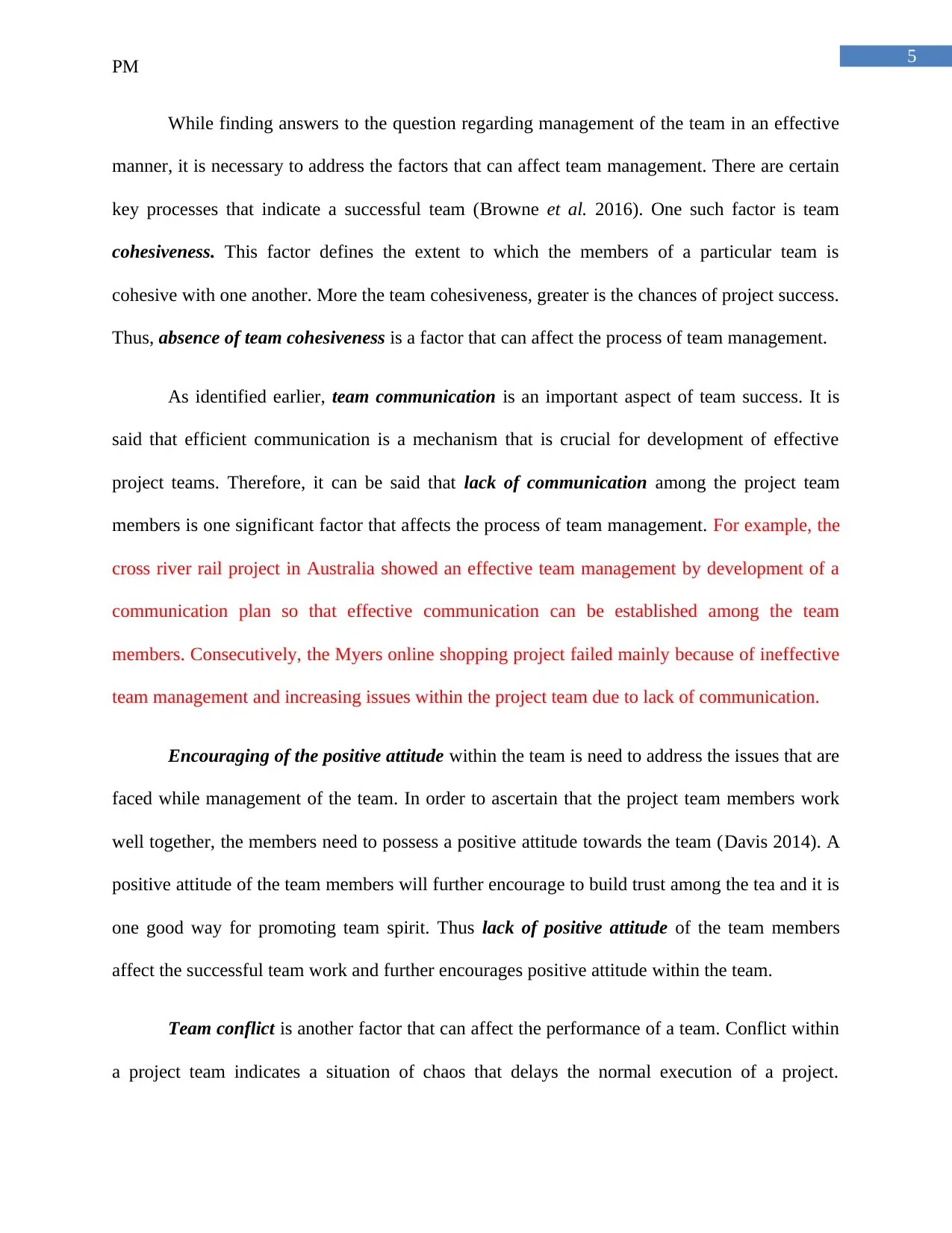
5
PM
While finding answers to the question regarding management of the team in an effective
manner, it is necessary to address the factors that can affect team management. There are certain
key processes that indicate a successful team (Browne et al. 2016). One such factor is team
cohesiveness. This factor defines the extent to which the members of a particular team is
cohesive with one another. More the team cohesiveness, greater is the chances of project success.
Thus, absence of team cohesiveness is a factor that can affect the process of team management.
As identified earlier, team communication is an important aspect of team success. It is
said that efficient communication is a mechanism that is crucial for development of effective
project teams. Therefore, it can be said that lack of communication among the project team
members is one significant factor that affects the process of team management. For example, the
cross river rail project in Australia showed an effective team management by development of a
communication plan so that effective communication can be established among the team
members. Consecutively, the Myers online shopping project failed mainly because of ineffective
team management and increasing issues within the project team due to lack of communication.
Encouraging of the positive attitude within the team is need to address the issues that are
faced while management of the team. In order to ascertain that the project team members work
well together, the members need to possess a positive attitude towards the team (Davis 2014). A
positive attitude of the team members will further encourage to build trust among the tea and it is
one good way for promoting team spirit. Thus lack of positive attitude of the team members
affect the successful team work and further encourages positive attitude within the team.
Team conflict is another factor that can affect the performance of a team. Conflict within
a project team indicates a situation of chaos that delays the normal execution of a project.
PM
While finding answers to the question regarding management of the team in an effective
manner, it is necessary to address the factors that can affect team management. There are certain
key processes that indicate a successful team (Browne et al. 2016). One such factor is team
cohesiveness. This factor defines the extent to which the members of a particular team is
cohesive with one another. More the team cohesiveness, greater is the chances of project success.
Thus, absence of team cohesiveness is a factor that can affect the process of team management.
As identified earlier, team communication is an important aspect of team success. It is
said that efficient communication is a mechanism that is crucial for development of effective
project teams. Therefore, it can be said that lack of communication among the project team
members is one significant factor that affects the process of team management. For example, the
cross river rail project in Australia showed an effective team management by development of a
communication plan so that effective communication can be established among the team
members. Consecutively, the Myers online shopping project failed mainly because of ineffective
team management and increasing issues within the project team due to lack of communication.
Encouraging of the positive attitude within the team is need to address the issues that are
faced while management of the team. In order to ascertain that the project team members work
well together, the members need to possess a positive attitude towards the team (Davis 2014). A
positive attitude of the team members will further encourage to build trust among the tea and it is
one good way for promoting team spirit. Thus lack of positive attitude of the team members
affect the successful team work and further encourages positive attitude within the team.
Team conflict is another factor that can affect the performance of a team. Conflict within
a project team indicates a situation of chaos that delays the normal execution of a project.
⊘ This is a preview!⊘
Do you want full access?
Subscribe today to unlock all pages.

Trusted by 1+ million students worldwide
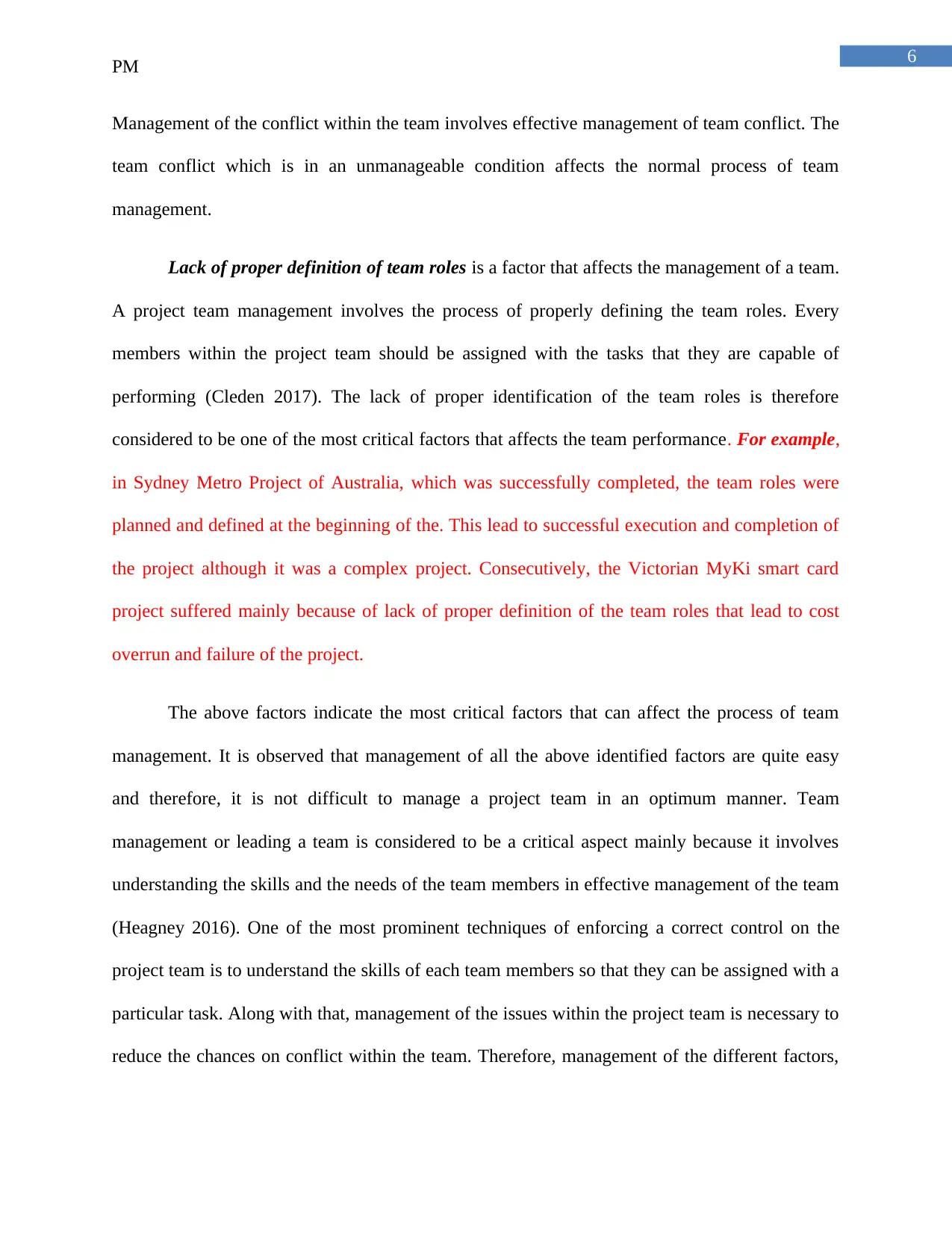
6
PM
Management of the conflict within the team involves effective management of team conflict. The
team conflict which is in an unmanageable condition affects the normal process of team
management.
Lack of proper definition of team roles is a factor that affects the management of a team.
A project team management involves the process of properly defining the team roles. Every
members within the project team should be assigned with the tasks that they are capable of
performing (Cleden 2017). The lack of proper identification of the team roles is therefore
considered to be one of the most critical factors that affects the team performance. For example,
in Sydney Metro Project of Australia, which was successfully completed, the team roles were
planned and defined at the beginning of the. This lead to successful execution and completion of
the project although it was a complex project. Consecutively, the Victorian MyKi smart card
project suffered mainly because of lack of proper definition of the team roles that lead to cost
overrun and failure of the project.
The above factors indicate the most critical factors that can affect the process of team
management. It is observed that management of all the above identified factors are quite easy
and therefore, it is not difficult to manage a project team in an optimum manner. Team
management or leading a team is considered to be a critical aspect mainly because it involves
understanding the skills and the needs of the team members in effective management of the team
(Heagney 2016). One of the most prominent techniques of enforcing a correct control on the
project team is to understand the skills of each team members so that they can be assigned with a
particular task. Along with that, management of the issues within the project team is necessary to
reduce the chances on conflict within the team. Therefore, management of the different factors,
PM
Management of the conflict within the team involves effective management of team conflict. The
team conflict which is in an unmanageable condition affects the normal process of team
management.
Lack of proper definition of team roles is a factor that affects the management of a team.
A project team management involves the process of properly defining the team roles. Every
members within the project team should be assigned with the tasks that they are capable of
performing (Cleden 2017). The lack of proper identification of the team roles is therefore
considered to be one of the most critical factors that affects the team performance. For example,
in Sydney Metro Project of Australia, which was successfully completed, the team roles were
planned and defined at the beginning of the. This lead to successful execution and completion of
the project although it was a complex project. Consecutively, the Victorian MyKi smart card
project suffered mainly because of lack of proper definition of the team roles that lead to cost
overrun and failure of the project.
The above factors indicate the most critical factors that can affect the process of team
management. It is observed that management of all the above identified factors are quite easy
and therefore, it is not difficult to manage a project team in an optimum manner. Team
management or leading a team is considered to be a critical aspect mainly because it involves
understanding the skills and the needs of the team members in effective management of the team
(Heagney 2016). One of the most prominent techniques of enforcing a correct control on the
project team is to understand the skills of each team members so that they can be assigned with a
particular task. Along with that, management of the issues within the project team is necessary to
reduce the chances on conflict within the team. Therefore, management of the different factors,
Paraphrase This Document
Need a fresh take? Get an instant paraphrase of this document with our AI Paraphraser
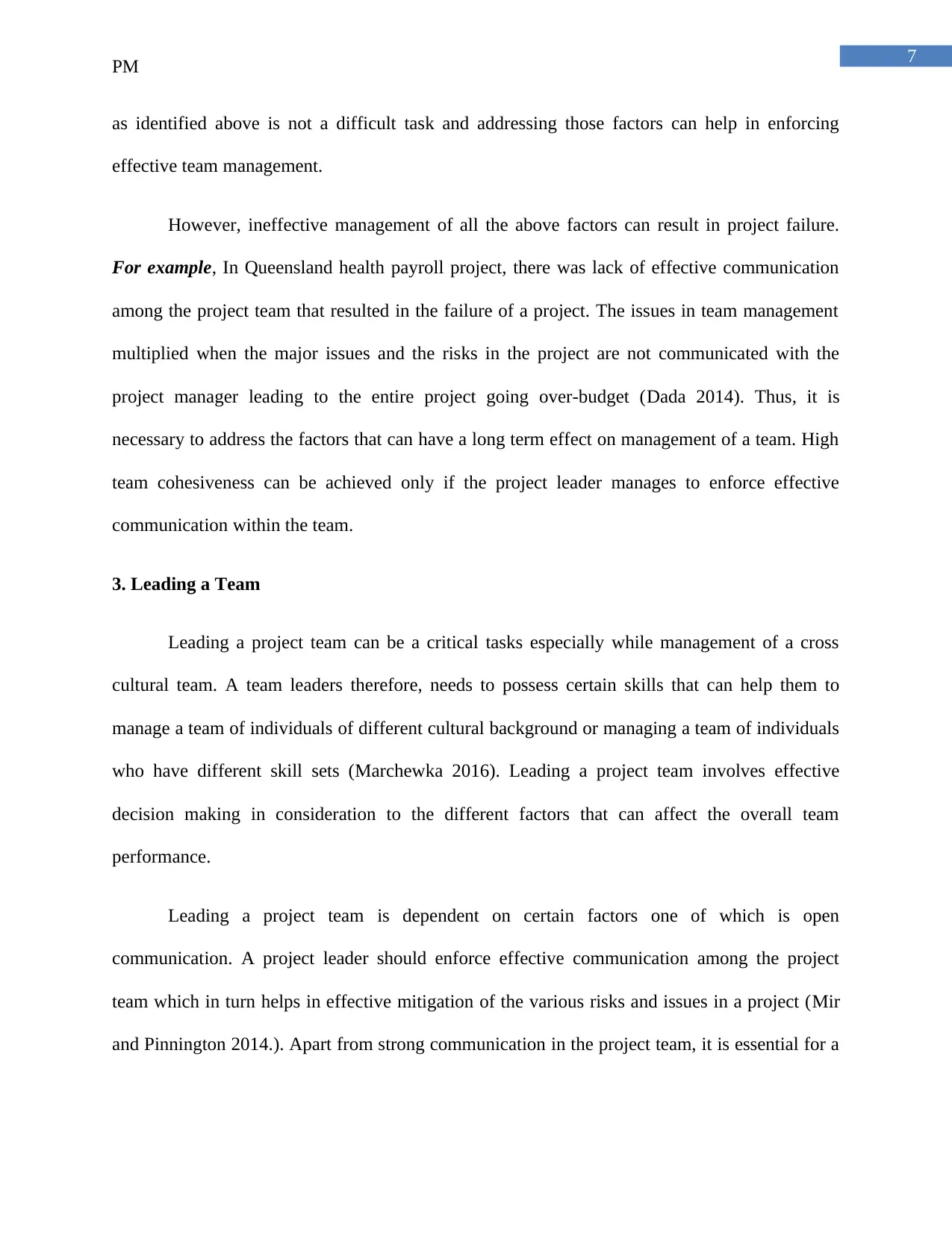
7
PM
as identified above is not a difficult task and addressing those factors can help in enforcing
effective team management.
However, ineffective management of all the above factors can result in project failure.
For example, In Queensland health payroll project, there was lack of effective communication
among the project team that resulted in the failure of a project. The issues in team management
multiplied when the major issues and the risks in the project are not communicated with the
project manager leading to the entire project going over-budget (Dada 2014). Thus, it is
necessary to address the factors that can have a long term effect on management of a team. High
team cohesiveness can be achieved only if the project leader manages to enforce effective
communication within the team.
3. Leading a Team
Leading a project team can be a critical tasks especially while management of a cross
cultural team. A team leaders therefore, needs to possess certain skills that can help them to
manage a team of individuals of different cultural background or managing a team of individuals
who have different skill sets (Marchewka 2016). Leading a project team involves effective
decision making in consideration to the different factors that can affect the overall team
performance.
Leading a project team is dependent on certain factors one of which is open
communication. A project leader should enforce effective communication among the project
team which in turn helps in effective mitigation of the various risks and issues in a project (Mir
and Pinnington 2014.). Apart from strong communication in the project team, it is essential for a
PM
as identified above is not a difficult task and addressing those factors can help in enforcing
effective team management.
However, ineffective management of all the above factors can result in project failure.
For example, In Queensland health payroll project, there was lack of effective communication
among the project team that resulted in the failure of a project. The issues in team management
multiplied when the major issues and the risks in the project are not communicated with the
project manager leading to the entire project going over-budget (Dada 2014). Thus, it is
necessary to address the factors that can have a long term effect on management of a team. High
team cohesiveness can be achieved only if the project leader manages to enforce effective
communication within the team.
3. Leading a Team
Leading a project team can be a critical tasks especially while management of a cross
cultural team. A team leaders therefore, needs to possess certain skills that can help them to
manage a team of individuals of different cultural background or managing a team of individuals
who have different skill sets (Marchewka 2016). Leading a project team involves effective
decision making in consideration to the different factors that can affect the overall team
performance.
Leading a project team is dependent on certain factors one of which is open
communication. A project leader should enforce effective communication among the project
team which in turn helps in effective mitigation of the various risks and issues in a project (Mir
and Pinnington 2014.). Apart from strong communication in the project team, it is essential for a
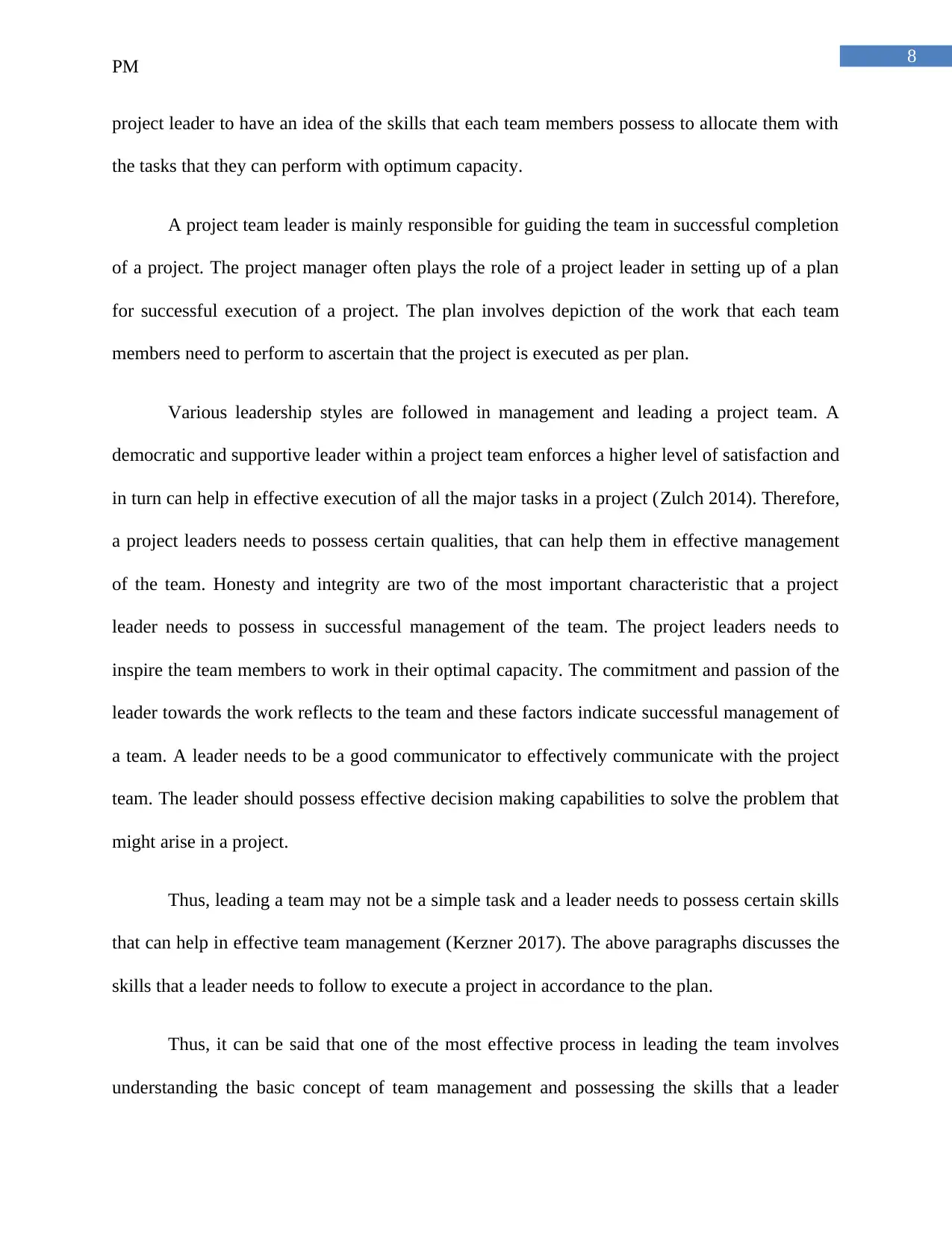
8
PM
project leader to have an idea of the skills that each team members possess to allocate them with
the tasks that they can perform with optimum capacity.
A project team leader is mainly responsible for guiding the team in successful completion
of a project. The project manager often plays the role of a project leader in setting up of a plan
for successful execution of a project. The plan involves depiction of the work that each team
members need to perform to ascertain that the project is executed as per plan.
Various leadership styles are followed in management and leading a project team. A
democratic and supportive leader within a project team enforces a higher level of satisfaction and
in turn can help in effective execution of all the major tasks in a project (Zulch 2014). Therefore,
a project leaders needs to possess certain qualities, that can help them in effective management
of the team. Honesty and integrity are two of the most important characteristic that a project
leader needs to possess in successful management of the team. The project leaders needs to
inspire the team members to work in their optimal capacity. The commitment and passion of the
leader towards the work reflects to the team and these factors indicate successful management of
a team. A leader needs to be a good communicator to effectively communicate with the project
team. The leader should possess effective decision making capabilities to solve the problem that
might arise in a project.
Thus, leading a team may not be a simple task and a leader needs to possess certain skills
that can help in effective team management (Kerzner 2017). The above paragraphs discusses the
skills that a leader needs to follow to execute a project in accordance to the plan.
Thus, it can be said that one of the most effective process in leading the team involves
understanding the basic concept of team management and possessing the skills that a leader
PM
project leader to have an idea of the skills that each team members possess to allocate them with
the tasks that they can perform with optimum capacity.
A project team leader is mainly responsible for guiding the team in successful completion
of a project. The project manager often plays the role of a project leader in setting up of a plan
for successful execution of a project. The plan involves depiction of the work that each team
members need to perform to ascertain that the project is executed as per plan.
Various leadership styles are followed in management and leading a project team. A
democratic and supportive leader within a project team enforces a higher level of satisfaction and
in turn can help in effective execution of all the major tasks in a project (Zulch 2014). Therefore,
a project leaders needs to possess certain qualities, that can help them in effective management
of the team. Honesty and integrity are two of the most important characteristic that a project
leader needs to possess in successful management of the team. The project leaders needs to
inspire the team members to work in their optimal capacity. The commitment and passion of the
leader towards the work reflects to the team and these factors indicate successful management of
a team. A leader needs to be a good communicator to effectively communicate with the project
team. The leader should possess effective decision making capabilities to solve the problem that
might arise in a project.
Thus, leading a team may not be a simple task and a leader needs to possess certain skills
that can help in effective team management (Kerzner 2017). The above paragraphs discusses the
skills that a leader needs to follow to execute a project in accordance to the plan.
Thus, it can be said that one of the most effective process in leading the team involves
understanding the basic concept of team management and possessing the skills that a leader
⊘ This is a preview!⊘
Do you want full access?
Subscribe today to unlock all pages.

Trusted by 1+ million students worldwide
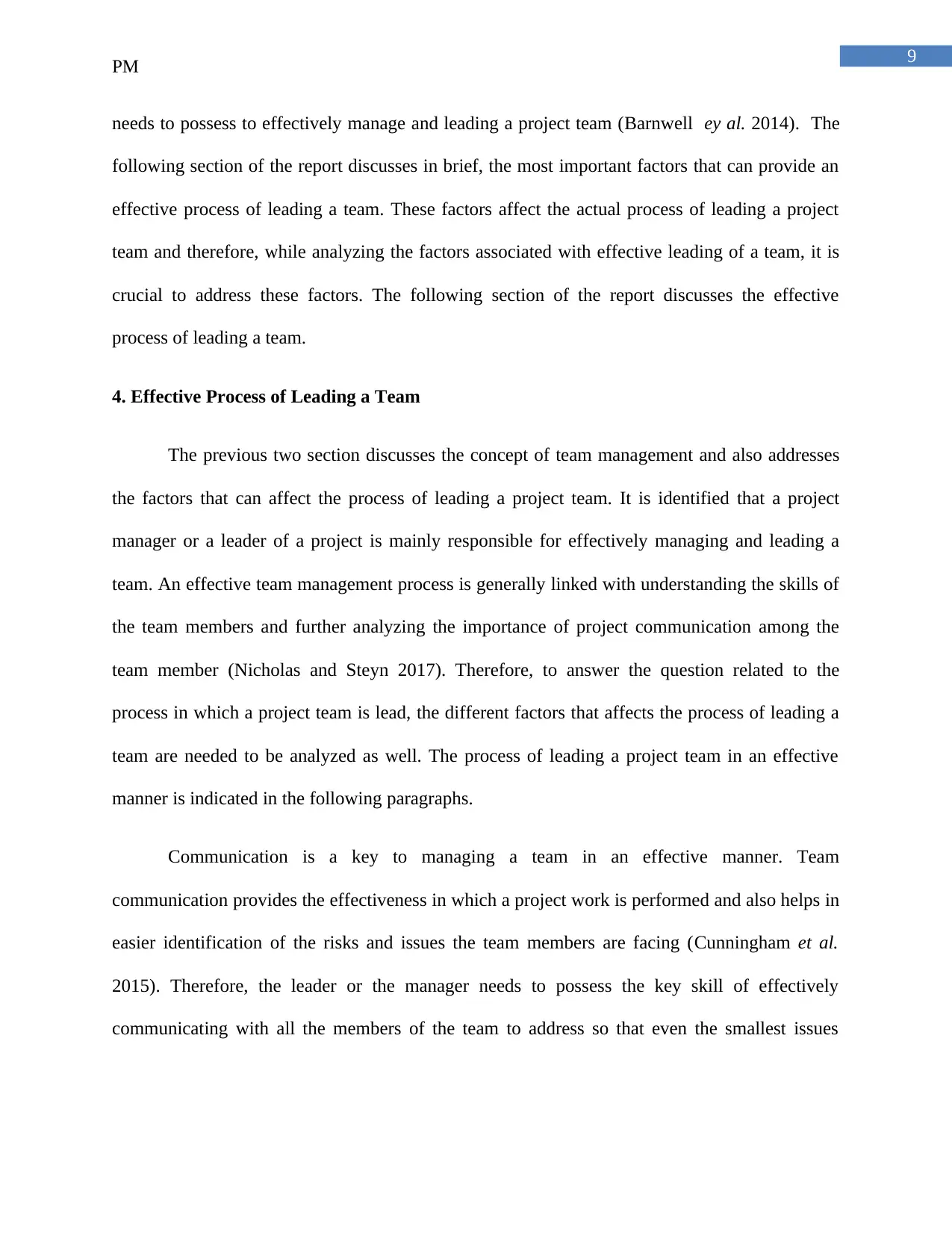
9
PM
needs to possess to effectively manage and leading a project team (Barnwell ey al. 2014). The
following section of the report discusses in brief, the most important factors that can provide an
effective process of leading a team. These factors affect the actual process of leading a project
team and therefore, while analyzing the factors associated with effective leading of a team, it is
crucial to address these factors. The following section of the report discusses the effective
process of leading a team.
4. Effective Process of Leading a Team
The previous two section discusses the concept of team management and also addresses
the factors that can affect the process of leading a project team. It is identified that a project
manager or a leader of a project is mainly responsible for effectively managing and leading a
team. An effective team management process is generally linked with understanding the skills of
the team members and further analyzing the importance of project communication among the
team member (Nicholas and Steyn 2017). Therefore, to answer the question related to the
process in which a project team is lead, the different factors that affects the process of leading a
team are needed to be analyzed as well. The process of leading a project team in an effective
manner is indicated in the following paragraphs.
Communication is a key to managing a team in an effective manner. Team
communication provides the effectiveness in which a project work is performed and also helps in
easier identification of the risks and issues the team members are facing (Cunningham et al.
2015). Therefore, the leader or the manager needs to possess the key skill of effectively
communicating with all the members of the team to address so that even the smallest issues
PM
needs to possess to effectively manage and leading a project team (Barnwell ey al. 2014). The
following section of the report discusses in brief, the most important factors that can provide an
effective process of leading a team. These factors affect the actual process of leading a project
team and therefore, while analyzing the factors associated with effective leading of a team, it is
crucial to address these factors. The following section of the report discusses the effective
process of leading a team.
4. Effective Process of Leading a Team
The previous two section discusses the concept of team management and also addresses
the factors that can affect the process of leading a project team. It is identified that a project
manager or a leader of a project is mainly responsible for effectively managing and leading a
team. An effective team management process is generally linked with understanding the skills of
the team members and further analyzing the importance of project communication among the
team member (Nicholas and Steyn 2017). Therefore, to answer the question related to the
process in which a project team is lead, the different factors that affects the process of leading a
team are needed to be analyzed as well. The process of leading a project team in an effective
manner is indicated in the following paragraphs.
Communication is a key to managing a team in an effective manner. Team
communication provides the effectiveness in which a project work is performed and also helps in
easier identification of the risks and issues the team members are facing (Cunningham et al.
2015). Therefore, the leader or the manager needs to possess the key skill of effectively
communicating with all the members of the team to address so that even the smallest issues
Paraphrase This Document
Need a fresh take? Get an instant paraphrase of this document with our AI Paraphraser
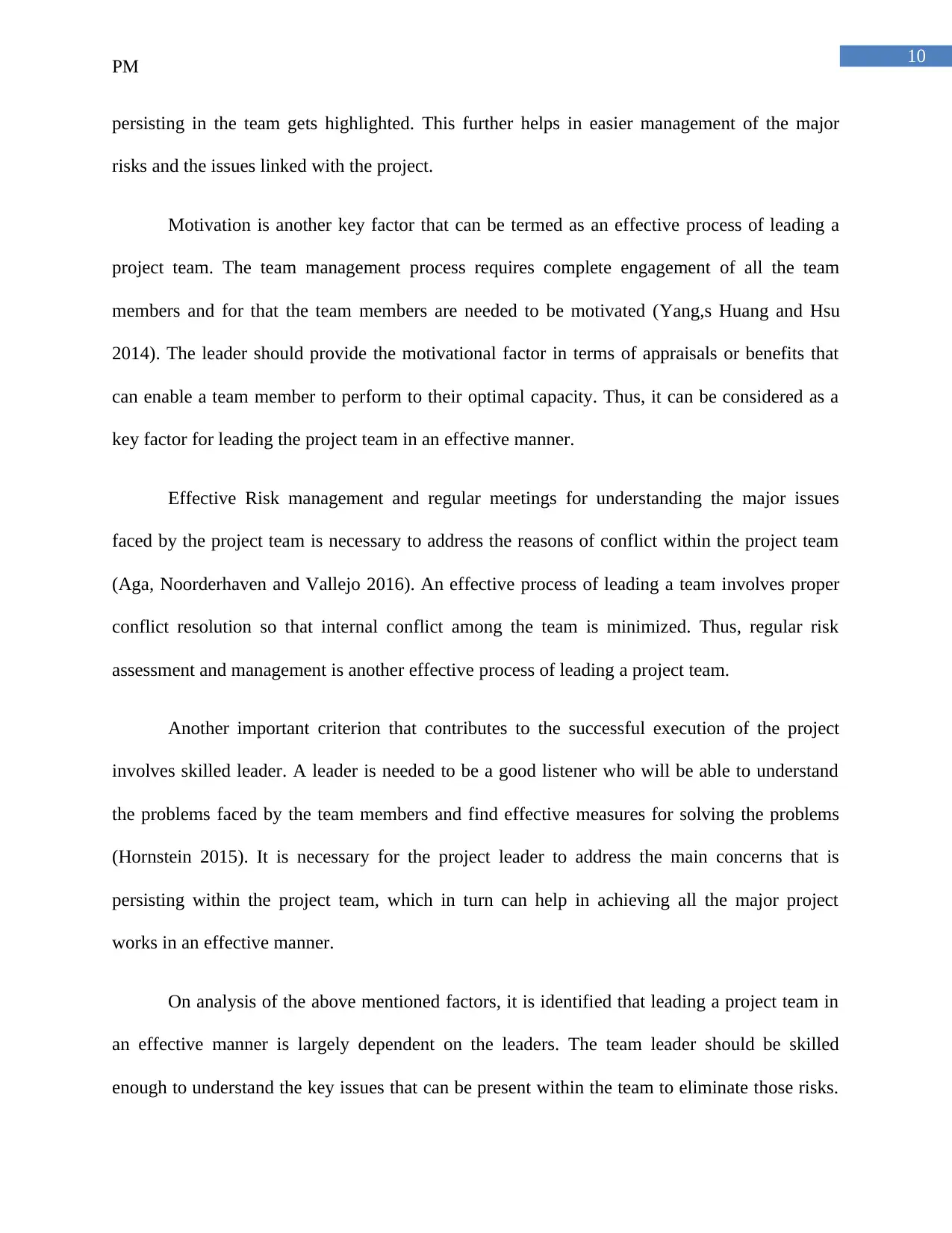
10
PM
persisting in the team gets highlighted. This further helps in easier management of the major
risks and the issues linked with the project.
Motivation is another key factor that can be termed as an effective process of leading a
project team. The team management process requires complete engagement of all the team
members and for that the team members are needed to be motivated (Yang,s Huang and Hsu
2014). The leader should provide the motivational factor in terms of appraisals or benefits that
can enable a team member to perform to their optimal capacity. Thus, it can be considered as a
key factor for leading the project team in an effective manner.
Effective Risk management and regular meetings for understanding the major issues
faced by the project team is necessary to address the reasons of conflict within the project team
(Aga, Noorderhaven and Vallejo 2016). An effective process of leading a team involves proper
conflict resolution so that internal conflict among the team is minimized. Thus, regular risk
assessment and management is another effective process of leading a project team.
Another important criterion that contributes to the successful execution of the project
involves skilled leader. A leader is needed to be a good listener who will be able to understand
the problems faced by the team members and find effective measures for solving the problems
(Hornstein 2015). It is necessary for the project leader to address the main concerns that is
persisting within the project team, which in turn can help in achieving all the major project
works in an effective manner.
On analysis of the above mentioned factors, it is identified that leading a project team in
an effective manner is largely dependent on the leaders. The team leader should be skilled
enough to understand the key issues that can be present within the team to eliminate those risks.
PM
persisting in the team gets highlighted. This further helps in easier management of the major
risks and the issues linked with the project.
Motivation is another key factor that can be termed as an effective process of leading a
project team. The team management process requires complete engagement of all the team
members and for that the team members are needed to be motivated (Yang,s Huang and Hsu
2014). The leader should provide the motivational factor in terms of appraisals or benefits that
can enable a team member to perform to their optimal capacity. Thus, it can be considered as a
key factor for leading the project team in an effective manner.
Effective Risk management and regular meetings for understanding the major issues
faced by the project team is necessary to address the reasons of conflict within the project team
(Aga, Noorderhaven and Vallejo 2016). An effective process of leading a team involves proper
conflict resolution so that internal conflict among the team is minimized. Thus, regular risk
assessment and management is another effective process of leading a project team.
Another important criterion that contributes to the successful execution of the project
involves skilled leader. A leader is needed to be a good listener who will be able to understand
the problems faced by the team members and find effective measures for solving the problems
(Hornstein 2015). It is necessary for the project leader to address the main concerns that is
persisting within the project team, which in turn can help in achieving all the major project
works in an effective manner.
On analysis of the above mentioned factors, it is identified that leading a project team in
an effective manner is largely dependent on the leaders. The team leader should be skilled
enough to understand the key issues that can be present within the team to eliminate those risks.
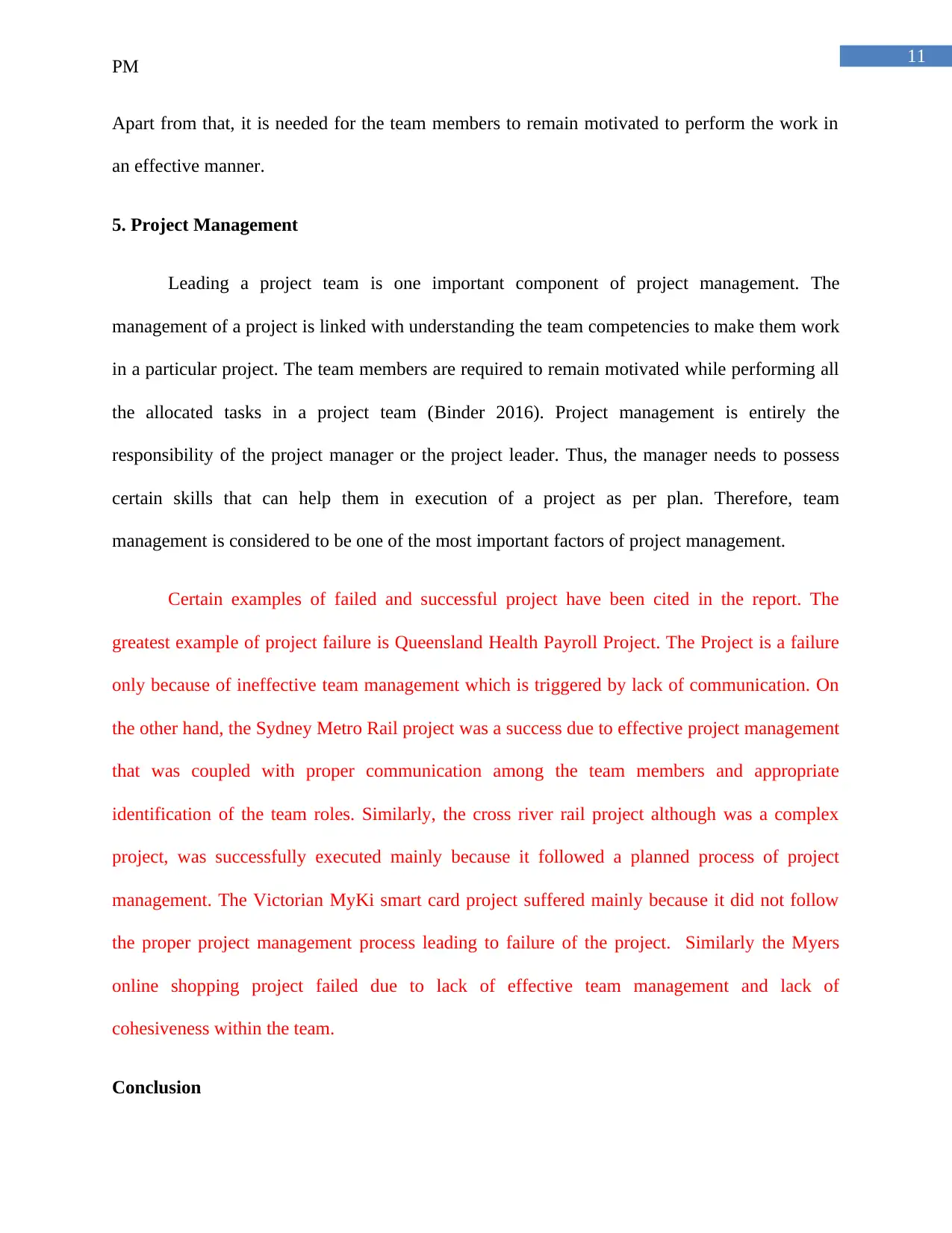
11
PM
Apart from that, it is needed for the team members to remain motivated to perform the work in
an effective manner.
5. Project Management
Leading a project team is one important component of project management. The
management of a project is linked with understanding the team competencies to make them work
in a particular project. The team members are required to remain motivated while performing all
the allocated tasks in a project team (Binder 2016). Project management is entirely the
responsibility of the project manager or the project leader. Thus, the manager needs to possess
certain skills that can help them in execution of a project as per plan. Therefore, team
management is considered to be one of the most important factors of project management.
Certain examples of failed and successful project have been cited in the report. The
greatest example of project failure is Queensland Health Payroll Project. The Project is a failure
only because of ineffective team management which is triggered by lack of communication. On
the other hand, the Sydney Metro Rail project was a success due to effective project management
that was coupled with proper communication among the team members and appropriate
identification of the team roles. Similarly, the cross river rail project although was a complex
project, was successfully executed mainly because it followed a planned process of project
management. The Victorian MyKi smart card project suffered mainly because it did not follow
the proper project management process leading to failure of the project. Similarly the Myers
online shopping project failed due to lack of effective team management and lack of
cohesiveness within the team.
Conclusion
PM
Apart from that, it is needed for the team members to remain motivated to perform the work in
an effective manner.
5. Project Management
Leading a project team is one important component of project management. The
management of a project is linked with understanding the team competencies to make them work
in a particular project. The team members are required to remain motivated while performing all
the allocated tasks in a project team (Binder 2016). Project management is entirely the
responsibility of the project manager or the project leader. Thus, the manager needs to possess
certain skills that can help them in execution of a project as per plan. Therefore, team
management is considered to be one of the most important factors of project management.
Certain examples of failed and successful project have been cited in the report. The
greatest example of project failure is Queensland Health Payroll Project. The Project is a failure
only because of ineffective team management which is triggered by lack of communication. On
the other hand, the Sydney Metro Rail project was a success due to effective project management
that was coupled with proper communication among the team members and appropriate
identification of the team roles. Similarly, the cross river rail project although was a complex
project, was successfully executed mainly because it followed a planned process of project
management. The Victorian MyKi smart card project suffered mainly because it did not follow
the proper project management process leading to failure of the project. Similarly the Myers
online shopping project failed due to lack of effective team management and lack of
cohesiveness within the team.
Conclusion
⊘ This is a preview!⊘
Do you want full access?
Subscribe today to unlock all pages.

Trusted by 1+ million students worldwide
1 out of 17
Related Documents
Your All-in-One AI-Powered Toolkit for Academic Success.
+13062052269
info@desklib.com
Available 24*7 on WhatsApp / Email
![[object Object]](/_next/static/media/star-bottom.7253800d.svg)
Unlock your academic potential
Copyright © 2020–2025 A2Z Services. All Rights Reserved. Developed and managed by ZUCOL.





